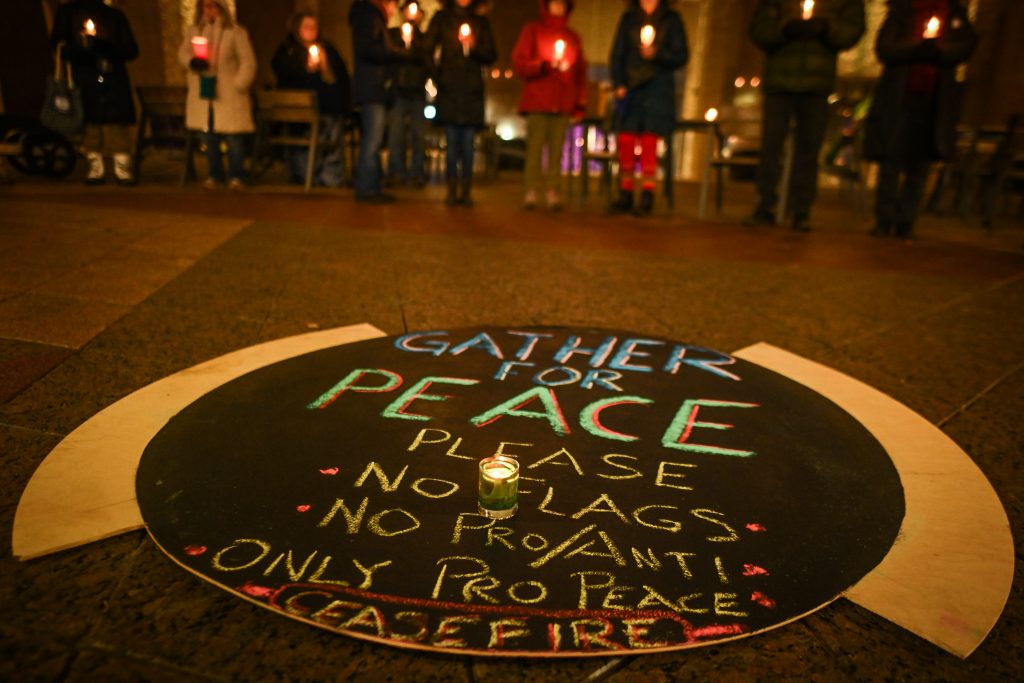Politics
Following Backlash, Artists Including Peter Doig and Tomás Saraceno Quietly Retracted Support From a Pro-Palestine Petition
Joan Jonas is also among those who have removed their names from the petition.

Joan Jonas is also among those who have removed their names from the petition.

Jo Lawson-Tancred

[A previous edition of this story and headline reported that “thousands” of people had withdrawn their signatures. That number was based on the discrepancy between the claim made by the group who authored the letter that it had 8,000 signatures and the 4,353 names that were listed on Artforum’s version of the letter on October 24. A cached version of the petition made the claim that Artforum was publishing the first 4,400 signatures. Penske Media has not responded to multiple requests for clarification on the number of signatories, which has not been substantiated.]
The art world is divided over how to respond to the ongoing crisis in the Middle East. Multiple public figures, including artists Peter Doig, Joan Jonas, Katharina Grosse, and Tomás Saraceno, have withdrawn their signatures from an open letter in support of Palestine published by Artforum and other media outlets on October 19. According to the authors of the letter, it was closed when it reached 8,000 signatories.
“We support Palestinian liberation,” the letter read. “We demand that the institutional silence around the ongoing humanitarian crisis that 2.3 million Palestinians are facing in the occupied and besieged Gaza Strip be broken immediately.”
Responses to the petition have homed in on the fact that, although the authors made calls to “reject violence against all civilians, regardless of their identity,” they never explicitly acknowledged or condemned the brutal attacks against Israelis by Hamas on October 7, which included kidnapping, rape, and torture and resulted in over 1,400 deaths. According to Jeremy Hodkin, author of The Canvas art industry newsletter, this omission “is both disconcerting and disingenuous.”
“The decision to decry Israel’s defensive actions without acknowledging this heinous act not only lacks balance but veers dangerously close to anti-Semitism,” he wrote in a statement on Instagram. He also noted that since The Canvas decried the art world’s silence in the wake of the attacks by Hamas, he has lost subscribers and sponsorship deals with galleries. “If standing against terrorism and advocating for the right of a nation to defend its citizens is so polarizing, then to those detractors, we proudly say: ‘unsubscribe’,” he added.
The petition was also addressed in a brief letter published by Artforum from the art dealers Dominique Lévy, Brett Gorvy, and Amalia Dayan, joint directors of Lévy Gorvy Dayan gallery with locations in New York, London, Paris, and Hong Kong. They described their distress to read a letter that “does not acknowledge the ongoing mass hostage emergency, the historical context, and the atrocities committed in Israel on October 7, 2023—the bloodiest day in Jewish history since the Holocaust.” Denouncing all violence in Israel and Gaza and calling for peace, they condemned the letter’s “one-sided view.”
On Sunday, the online magazine Erev Rav published a letter directed at cultural organizations that has so far been signed by over 2,500 people, including the artists Hito Steyerl, Ron Arad, and Tal R, the art historian Dorothee Richter, and the gallerist Johann König. “What’s most upsetting is the complete absence of any mention of over 200 people kidnapped, most of them civilians, including babies, children, old and sick people,” the letter states. “Those who signed the letter demand a ceasefire for humanitarian reasons. But, in the letter, the hostages are not part of the humanity they are appealing for.”
“There should be no contradiction between staunchly opposing the Israeli occupation and the humanitarian crisis in Gaza, and unequivocally condemning brutal acts of violence against innocent civilians in Israel,” it concluded. “Both should come together.”
In an update dated October 23, the authors of the original letter published in Artforum clarified that the rejection of “violence against all civilians, regardless of their identity,” included a shared “revulsion at the horrific massacres of 1,400 people in Israel conducted by Hamas on October 7th,” adding: “We mourn all civilian casualties. We hope for the expeditious release of all hostages and continue to call for an immediate ceasefire.”
Few of those who retracted their support from the original petition have yet spoken publicly about their reasons. “I made a terrible mistake,” said the artist Katharina Grosse in a statement. “I signed the open letter in the midst of a state of emotional shock caused by the horrific violence against civilian lives on all sides.” She called out the letter’s failure to acknowledge the atrocities committed by Hamas, adding “that omission has created more hurt and confrontation, and so have I by signing it. I apologize for my ignorance.”
“I believe many of the signatories are now realizing they put their name down on a very dangerous letter,” said Steeve Nassima, co-founder of the Nassima Landau Art Foundation in Tel Aviv, over the phone. While he identified himself as staunchly against the politics of the current Israeli government, he added “this is not about politics, its about basic human decency” and expressed his shock at the “extreme, one-sided” letter, which he also addressed on Instagram. “If these institutions stood up in reaction to [the murder of] George Floyd and the Russian war on Ukraine, why did they stay silent on October 8th?” he asked. “At that time, there was no side to take, it was about showing compassion. By staying silent, they did take a side.”
“I have heard that some respected collectors who have artworks by some of the signatories feel a certain unease at seeing those works hanging on their wall knowing that the artist signed what they perceive is an anti-Semitic letter,” he added.
Notable figures whose names have so far remained on the list include Nan Goldin, Barbara Kruger, and Judith Butler, who recently wrote a nuanced condemnation of Hamas in the London Review of Books.
Additional reporting by Katya Kazakina.